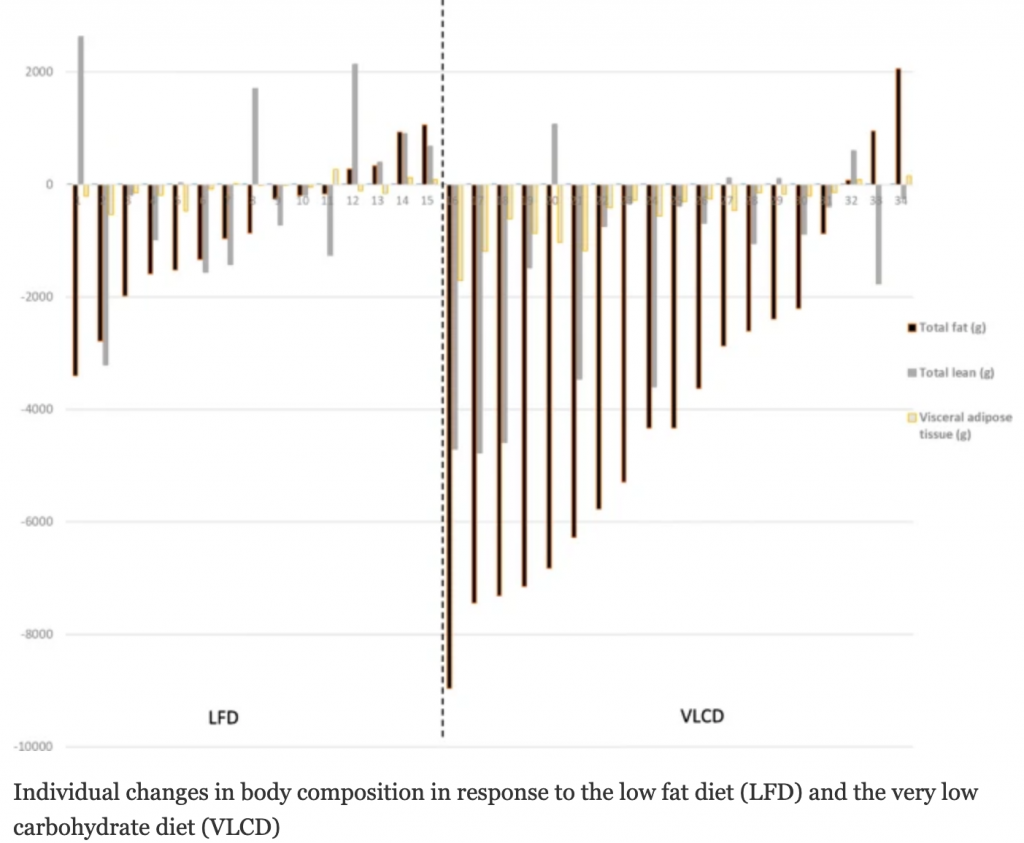What is the value of very low carbohydrate diets? A new study, published in Nutrition and Metabolism, from researchers with the University of Alabama at Birmingham’s Nutrition Obesity Research Center observed improvements in body composition, fat distribution and metabolic health in response to an eight-week, very low-carbohydrate diet.
Very Low-Carbohydrate Diet
The diet emphasized low-glycemic sources of carbohydrate, and included mainly whole foods such as:
- Leafy greens, non-starchy vegetables, some fruits, and high fiber grains with minimal highly processed grain products and added sugar.
- Fat-containing foods included olive, coconut, and nut oils; butter; tree nuts and nut butters; cheese; cream; coconut milk; and avocados.
- A number of full-fat dairy products were included. Saturated fat from red meat was `limited to less than 10% of daily caloric intake.
- Patients obtained the majority of their fat intake from mono-unsaturated fatty acids (e.g. olive oil), and medium-chain triglycerides (e.g., coconut oil and cream); from nuts and nut butters; and from fresh fish.
Older adults with obesity are at particularly high risk of developing cardiometabolic disease such as Type 2 diabetes and cardiovascular disease. Rather than total fat mass, deposition of fat in certain areas, such as the abdominal cavity and skeletal muscle, may confer this greatest risk of disease development.
- Participants lost an average of 9.7 and 2.0% in total fat following the VLCD and low-fat diet (LFD), respectively (p < 0.01).
- The VLCD group experienced ~ 3-fold greater loss in visceral adipose tissue (VAT) compared to the LFD group (− 22.8% vs − 1.0%, p < 0.001) and a greater decrease in thigh-IMAT (intermuscular adipose tissue) (− 24.4% vs − 1.0%, p < 0.01).
- The VLCD group also had significantly greater thigh skeletal muscle (SM) at 8 weeks following adjustment for change in total fat mass.
- Finally, the VLCD had greater increases in insulin sensitivity and HDL-C and decreases in fasting insulin and triglycerides compared to the LFD group.
Body Composition Changes from a Very Low-Carbohydrate Diet

The study’s lead author is Amy Goss, Ph.D., RDN, an assistant professor with UAB’s Department of Nutrition Sciences. Goss says her team aimed to determine if a very low-carbohydrate, or VLCD, high-fat diet would deplete these fat depots and preserve lean mass without intentional caloric restriction in older adults with obesity, thereby improving outcomes related to cardiometabolic disease, such as insulin sensitivity and the lipid profile.
“After the eight-week intervention, despite the recommendation to consume a weight-maintaining diet, the group consuming the very low-carbohydrate diet lost more weight and total fat mass than the control diet group,” Goss said.
This is the first study to report a 24% decrease in IMAT in response to a 8-wk, VLCD intervention in older adults, a population that tends to accumulate high amounts of lipid in the skeletal muscle. These changes would be expected to improve a number of outcomes related to metabolic health and physical function. The primary difference in fat lost between the two groups was from the abdominal cavity and the skeletal muscle depots.
“We also found significant improvements in the overall lipid profile that would reflect decreased risk of cardiovascular disease,” Goss said. “Further, insulin sensitivity improved in response to the very low-carbohydrate diet reflecting reduced risk of Type 2 diabetes. Overall, we observed improvements in body composition, fat distribution and metabolic health in response to an eight-week, very low-carbohydrate diet.”
VLCD Effect on Diabetes
Goss says VLCDs are a therapeutic option for many conditions, including Type 2 diabetes, obesity and non-alcoholic fatty liver disease.
“This study extends previous research to show that it can be a safe, therapeutic option for older adults in their 70s experiencing obesity,” she said. “This is the first study to demonstrate depletion of ‘metabolically harmful’ fat depots while preserving skeletal muscle during weight loss in response to a VLCD in older adults.”
Goss adds that there is quite a bit of evidence about the benefits of a very low-carbohydrate diet in younger populations, and this study was one of the first to test this dietary approach to improve outcomes related to obesity in adults older than age 65 — a population at particularly high risk of other diseases and in need of therapeutic interventions to improve health while preserving skeletal muscle mass to prevent or delay functional decline with age.
Conclusion/ In conclusion, the VLCD induced significant weight loss and reduced VAT and thigh-IMAT in a group of older adults with obesity. Depletion of these adipose tissue depots may be critical for reducing the risk of metabolic disease with advancing age. Furthermore, despite significant loss of fat mass, those consuming the VLCD retained greater thigh skeletal muscle volume. Weight loss in response to a very low CHO, energy restricted diet also improved hepatic and peripheral insulin sensitivity suggesting a reduced risk of cardiometabolic disease.
Click Here for Full Text Study





